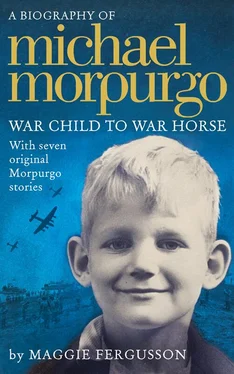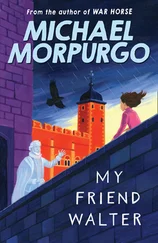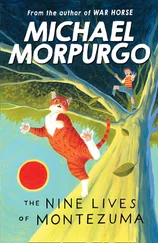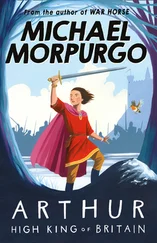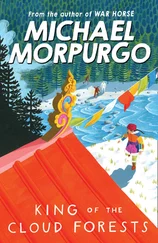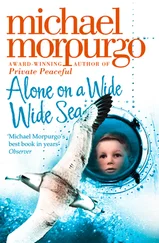Michael’s grandmother, Tita, was a large, imposing woman who gave Michael his first inklings ‘of what God might be like’. Before her marriage she had been a Shakespearean actress. She had a voice so deep and tremendous that she was often given men’s parts. Her mother, Marie Brema, had been a professional opera singer, who was once summoned to Buckingham Palace to sing for Queen Victoria.
Neither Tita nor her mother had their heads turned by success. Both believed deeply in Christian charity and most of the money they made on stage was poured into Brema Looms, a workshop providing employment for crippled girls from London’s East End.
In 1906 Tita, who in her late twenties had never so much as kissed a man, had met and fallen in love with a Belgian poet, scholar and nationalist, Emile Cammaerts. There were differences between them. Emile spoke very little English, and was an atheist. Tita set about tackling both problems with great forcefulness.
And she succeeded. A Belgian woman was engaged to teach Emile English (they began their lessons by teasing out Othello , line by line) so that by the time he and Tita were married in 1908 his English was fluent. He had also converted to Christianity with a zeal that would never leave him. As there was little prospect of Tita’s pursuing her stage career in Belgium, and as she felt she must look after her mother, they settled in London, before moving, as their family grew, to Radlett – a village in Hertfordshire.
Tall, and with a fine, monumental head, Emile Cammaerts became revered in academic and literary circles both for his intellect and for his passionate devotion to Belgium. Invalided out of the First World War with a weak heart, he threw his energies instead into composing fiery, defiant, patriotic poems to encourage his compatriots. He was Belgium’s equivalent of Rupert Brooke, the famous British poet of the First World War.
So patriotic was Emile, in fact, that when his fourth child’s birth coincided with a significant Belgian victory over the Germans, he named her after the hamlet, De Kippe, where this had taken place. This daughter, Kippe, would grow up to become Michael’s mother, and an actor like her mother.
To Michael, as a small boy, Emile Cammaerts seemed ‘all that a grandfather should be’. He had a flowing beard, thick tweed suits and heavy brown shoes. He emanated jollity. His theme tunes, in Michael’s memories, are Mozart’s horn concertos, to which he would bounce his grandchildren on his knee; and he had about him what his Times obituary would describe as an air of ‘enchanted innocence’. Though he had made his career as an academic, his earliest published works had been plays for children, and he had written a study of nonsense verse. He would delight Michael with recitals of ‘The Owl and the Pussy-cat’, ‘The Dong with a Luminous Nose’ and, most memorably,
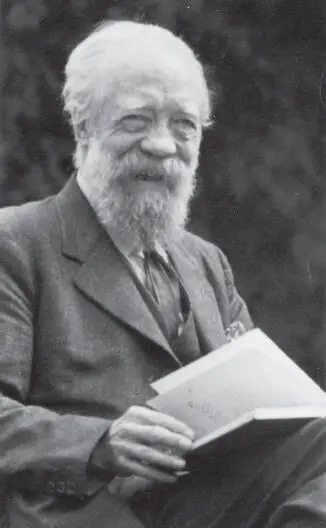
There was an Old Man with a beard,
Who said, ‘It is just as I feared! –
Two Owls and a Hen, four Larks and a Wren,
Have all built their nests in my beard!’
With this background – three generations of actors, from his opera-singing great-grandmother to his mother, and a grandfather who wrote plays for children, is it any wonder that Michael turned out a storyteller?
Emile Cammaerts’s reputation was considerably greater than his income, and with six children he and Tita were forced to run the household at the Eyrie along strict make-do-and-mend lines. Michael’s aunt Jeanne remembers Tita darning broken bed springs with 15-amp fuse wire; and avoiding, wherever possible, spending money on clothes, either for herself or for the children.
There was one area in which indulgence was encouraged. The early lives of both Emile and Tita had been bleak. Tita’s father had separated from her mother soon after her birth, abandoning her to a lonely, rootless existence, trailing with her diva mother round the concert halls and opera houses of Europe. Emile’s father had, similarly, left his mother, just before his birth. Both Emile and Tita, as they grew up, had sought security and comfort in beauty – the beauty of the natural world, and the beauty of art.
At the Eyrie they set out to create a home in which their children would be surrounded and sustained by music and painting and books. ‘Every meal,’ Jeanne laughs, ‘was a seminar.’ Even games of rummy and racing demon bristled with moral and intellectual competition. In the red-linoed first-floor nursery, parents and children gathered round a huge black table to read Shakespeare plays – Tita making a memorable Othello.
With such a rich diet of culture, there was little appetite for material comfort. Asked to choose between a new stair carpet and a gramophone recording of Schubert’s trios, Jeanne and her siblings voted unanimously for Schubert.
Sitting in an armchair in an old people’s home in Oxford, Jeanne, now in her late eighties, looks back with gratitude and love on the home that her parents created: ‘They had no model to go on, but they were trying to make a perfect world for us.’ And to some extent, for a while at least, they succeeded.
But, of the six children, the plain living and high thinking at the Eyrie suited Michael’s mother Kippe least well. Her gifts were intuitive rather than intellectual, and at St Albans High School, though she shone on the lacrosse field, the teachers made it clear that she was a disappointment after her academic sisters. She was, perhaps, slightly dyslexic. During the family readings of Shakespeare she stumbled over her parts, and this was bitter to her because she had, in fact, a natural feeling for words and characters. The frustration and humiliation she suffered as a result led her to bully her younger, brighter sister, Jeanne.
Increasingly, Kippe recognised that what she really wanted was to act. After school she won a place at RADA, and from there she went on to build a successful career in repertory. It was in the middle of a rehearsal in the Odeon Hall, Canterbury, in the autumn of 1938, that a man called Tony Bridge stepped on to the scene.
There was nothing remarkable-seeming about this new recruit to the company. A year older and slightly shorter than Kippe, he was not especially good-looking. Yet within weeks of their meeting, Tony and Kippe – or Kate, as he called her – were spending almost all their time together, heading off into the Kent countryside for long walks when they were not required on stage.
In Tony Bridge, Kippe had found a companion of real kindness, a man with what one of his friends later described as an extraordinary gift for ‘ordinary human understanding’. The only child of lower-middle-class Londoners, he had a talent for amusing people, and for lightening and cheering any company in which he found himself. He made Kippe feel safe and happy. A friend, Mary Niven, remembers a joyful evening she spent with the two of them, during which they sang together. ‘They triggered each other off. They were lost in delight.’
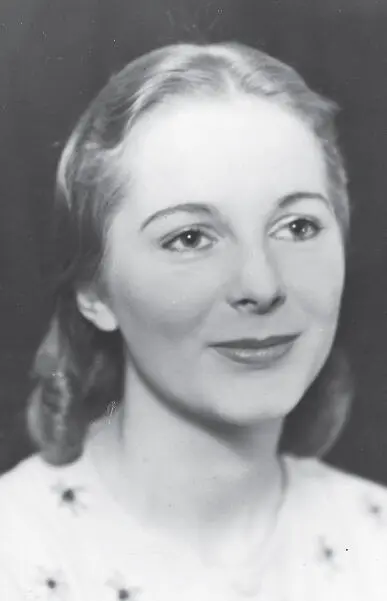
Through the beautiful summer of 1939, their repertory company played to dwindling audiences until, on the outbreak of war, the Odeon Hall was closed. The following spring Tony Bridge was called up, and for the next eighteen months he was shunted from camp to camp around Britain, settling at last in the Scottish coastal town of Montrose. On 26 June 1941, during a short army leave, Tony and Kippe were married at Christ Church, Radlett. They are captured in a photograph on the steps of the church, Kippe beaming and beautiful, Tony in his army battledress and heavy boots, the Cammaerts and Bridge parents flanking them, smiling as the occasion demanded.
Читать дальше
